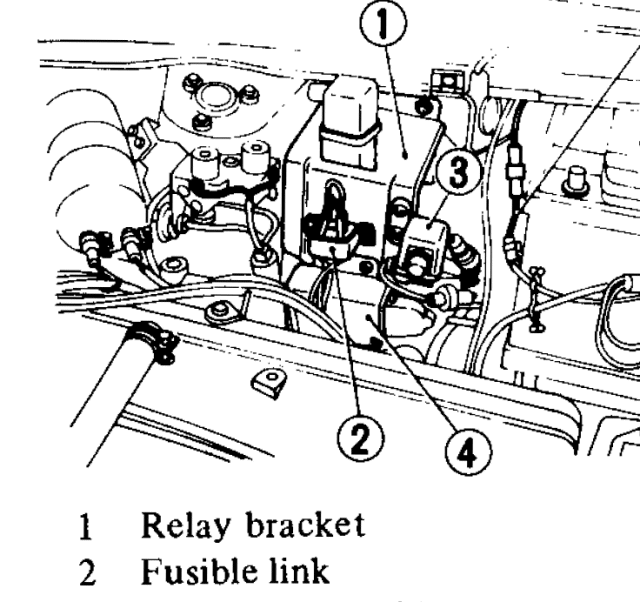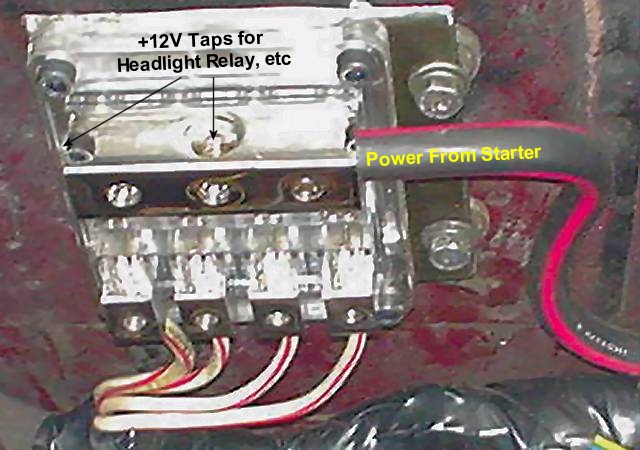1975 280z
Note: This is as per 75 FSM. I have not verified. The 77 FSM differs from real life on this matter.

Fusible link info
Fusible links are the same as fuses. They are wires with a built-in melting point.
When the current through the link exceeds a threshold, the heat produced melts the wire to prevent too much current from damaging down stream devices.
Fusible links are usually in the form of wires but some are made from flat springy metal.Here are standard Nissan "Pacific" wire colours, their rated melting currents, and cross sectional area:
(Thanks to Wayne Monteath for uncovering this rare table!).
Pink 30 amp Green 40 amps 0.50mm˛ Red 50 amps 0.69mm˛ Yellow 60 amps Black 80 amps 1.25mm˛ Blue 100 amps Note: Fusible links are designed to melt and not catch fire. Regular wires can catch fire. Do not substitute!
1975 280z
Note: This is as per 75 FSM. I have not verified. The 77 FSM differs from real life on this matter.
1976 280z
This is from a spare '76 2+2 280z harness I have in the basement.
The labels on the side of the 76 FSM say:ACC (B) ??L (Br)
IGN (Br) IGN (G)
76 2+2 280z
1977 280z
Here are the fusible link locations for a 1977 280z:
I verified these in my engine compartment using a multimeter as drawings in the FSM and postings on various forums were conflicting.
Note, the FSM states that the red links are (BR) which means black with red stripe.
77 280z correct fusible link pattern
77 280z correct fusible link pattern
They also have AGU glass fuse version.
The box next to the strut tower is a sheet metal rain guard. It covers the fusible links and voltage regulator.
Underneath are the fusible link covers. "Johnson & Johnson" medicine bottles!! Thank God for PO's!
Digging deeper... original covers and fusible links removed from side of engine compartment
I used an old 76 or 77 transistor module to make a mounting plate and used two existing 10mm bolts near the strut tower to hold the maxifuse box
This is a crappy blurry photo but you can see the 4 white with red stripped wires connected to the screw terminals in the bottom of the maxifuse unit. (one is about to be connected, I tried to photograph the stripped wire but a tiny LCD and auto focus get you every now and then. You can see the 4 white +POS wires going to the top of the photo.
Here you can see how Nissan took one white main +12V power wire from the +Pos starter terminal, then they split it then split it again to make 4! The black tapped splices are factory!!! I just cut back the wiring harness wrapper to expose the crazy splicing.
I just snipped them off and also snipped the other end (white wire to starter +pos)
Not pretty but here is the final product. The black with red stripe wire was from a gutted 200sx battery cable. It goes directly to the +pos on the starter and replaces the white wires I complained about above.Don't you just love the "detailed engine compartment" the PO claimed!!! Crappy black paint over the stock wine colour!

Here you can see the black with red wire route to the +pos on the starter
Installed. Green fuse in front is 60A (It should be 80A but I could not source one). The other Red's are 50A..
Get this Stinger Maxi Fuse Block and swap out your crusty, old, troublesome, high maintenance fusible link blocks.
Typically $40USD but only $120CAD at Wacky Wheatley's!! Stinger is also sold by Futureshop.
Model No: SHD4MAX
UPC Code : 609098079341This pair are from Wal-Mart's stereo section.
Links (Pun):
Buy fusible link parts at Banzai